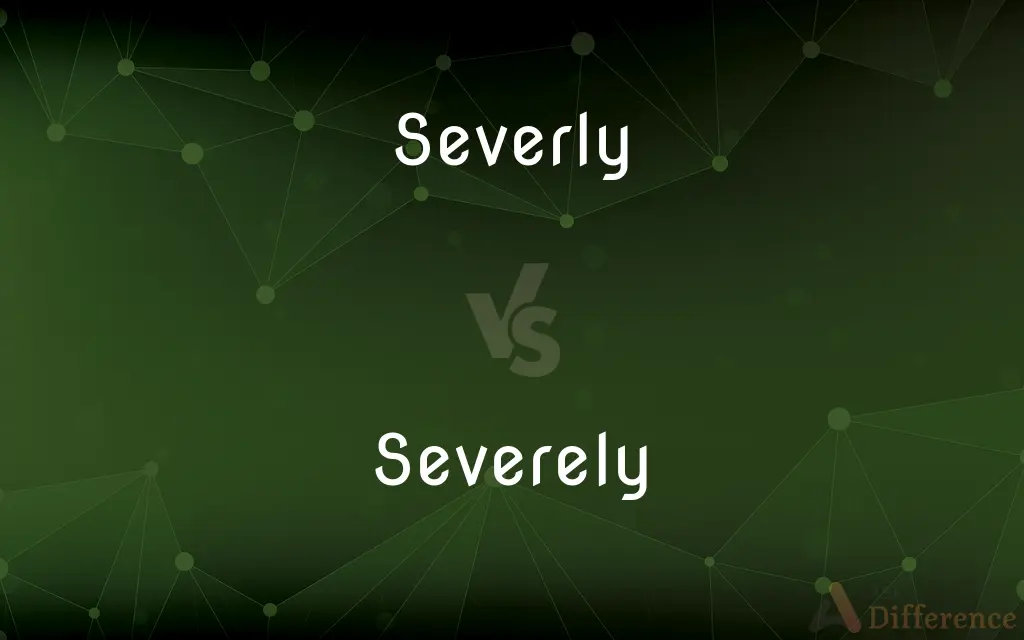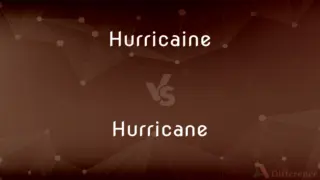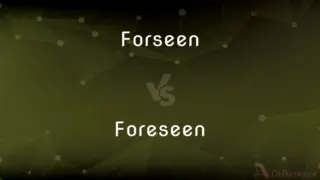Severly vs. Severely — Which is Correct Spelling?
Edited by Tayyaba Rehman — By Fiza Rafique — Updated on March 31, 2024
"Severly" is incorrect. The right spelling is "Severely," which means to an intense or extreme degree.

Table of Contents
Which is correct: Severly or Severely
How to spell Severely?

Severly
Incorrect Spelling

Severely
Correct Spelling
ADVERTISEMENT
Key Differences
Remember that many adverbs in English end in "-ely."
Visualize the word as "severe" + "ly" to reinforce its construction.
Use mnemonic phrases like “A severe penalty applied severely.”
Recall the root word "severe" and simply add "ly" to form "severely."
Note that "severely" sounds like it has three syllables; "sever-ly" would cut it short.
ADVERTISEMENT
How Do You Spell Severely Correctly?
Incorrect: The company was severly affected by the economic downturn.
Correct: The company was severely affected by the economic downturn.
Incorrect: The drought has severly impacted the crops.
Correct: The drought has severely impacted the crops.
Incorrect: His leg was severly injured in the accident.
Correct: His leg was severely injured in the accident.
Incorrect: The storm severly damaged the coastal area.
Correct: The storm severely damaged the coastal area.
Incorrect: He was severly criticized for his actions.
Correct: He was severely criticized for his actions.
Severely Definitions
To an intense or extreme degree.
She was severely injured in the accident.
Without indulgence or leniency.
The judge severely sentenced the criminal.
Rigorously or sharply.
His confidence was severely tested during the trial.
In a strict or harsh manner.
He was severely punished for his actions.
In a grave or serious manner.
The town was severely affected by the flood.
Unsparing, harsh, or strict, as in treatment of others
A severe critic.
Marked by or requiring strict adherence to rigorous standards or high principles
A severe code of behavior.
Stern or forbidding, as in manner or appearance
Spoke in a severe voice.
Extremely plain in substance or style
A severe black dress.
Causing great discomfort, damage, or distress
A severe pain.
A severe storm.
Very dangerous or harmful; grave or grievous
Severe mental illness.
Extremely difficult to perform or endure; trying
A severe test of our loyalty.
In a severe manner.
To a severe or serious degree;
Fingers so badly frozen they had to be amputated
Badly injured
A severely impaired heart
Is gravely ill
Was seriously ill
With sternness; in a severe manner;
`No,' she said sternly
Peered severely over her glasses
Causing great damage or hardship;
Industries hit hard by the depression
She was severely affected by the bank's failure
Severely Meaning in a Sentence
The city's infrastructure was severely compromised after the earthquake.
They were severely understaffed during the holiday rush.
Her vision is severely impaired without her glasses.
His confidence was severely shaken by the incident.
The test was severely difficult, leaving many students frustrated.
The athlete's performance was severely hindered by a knee injury.
The patient is severely dehydrated and needs immediate attention.
Her remarks were severely out of line with the company's values.
The garden has been severely neglected this summer.
Their relationship was severely tested during the crisis.
Food production has been severely impacted by the drought.
Pollution has severely contaminated the river over the years.
The population of bees has been severely reduced in recent years.
She was severely disappointed with the outcome of the meeting.
Their privacy was severely invaded by the media.
He was severely reprimanded for breaking the rules.
The team's morale was severely affected by the loss.
He criticized her work severely, leaving no room for doubt about his dissatisfaction.
Travel plans were severely disrupted by the storm.
The law was severely enforced to prevent further incidents.
She was severely allergic to nuts and had to be very careful about her diet.
The book was severely criticized for its lack of originality.
Prices have severely increased due to the shortage of supplies.
His health has severely declined in the last few months.
The historical building was severely damaged and required extensive repairs.
Common Curiosities
Which vowel is used before Severely?
The vowel "e" is used before the final "-ly" in "severely."
What is the pronunciation of Severely?
Severely is pronounced as /sɪˈvɪrli/.
Why is it called Severely?
The term "severely" is derived from the adjective "severe," with the suffix "-ly" to form an adverb indicating the manner of an action.
What is the verb form of Severely?
"Severely" is an adverb, and the related verb form is "sever."
What is the singular form of Severely?
"Severely" is an adverb and does not have a singular or plural form.
What is the root word of Severely?
The root word is "severe."
What is the plural form of Severely?
"Severely" does not have a plural form.
Which conjunction is used with Severely?
Any conjunction such as "and" or "but" can be used with "severely," depending on the sentence.
Is Severely a noun or adjective?
"Severely" is neither a noun nor an adjective; it is an adverb.
Is Severely an adverb?
Yes, "severely" is an adverb.
Which article is used with Severely?
As an adverb, "severely" typically doesn't need an article. However, in certain contexts, "the" or "a" might precede an adjective or noun modified by "severely."
Is Severely an abstract noun?
No, "severely" is not an abstract noun.
Is Severely a negative or positive word?
"Severely" generally has a negative connotation as it indicates extremeness, often in situations of harm, strictness, or intensity.
What is a stressed syllable in Severely?
The second syllable "ver" is stressed in "severely."
Which determiner is used with Severely?
"Severely" as an adverb typically does not require a determiner. However, determiners like "the" or "a" might precede an adjective or noun modified by "severely."
What is the first form of Severely?
The related verb form is "sever."
Which preposition is used with Severely?
It varies by context. Prepositions like "by" or "in" can be used, as in "severely affected by" or "severely in pain."
Is Severely a countable noun?
"Severely" is not a noun; it's an adverb.
Is the Severely term a metaphor?
No, "severely" in itself is not a metaphor, but it can be used in metaphorical expressions.
Is the word Severely imperative?
No, "severely" is not in the imperative form.
Is the word Severely a Gerund?
No, "severely" is not a gerund.
Is Severely a collective noun?
No, "severely" is not a collective noun.
Is the word “Severely” a Direct object or an Indirect object?
"Severely" is an adverb and does not function as a direct or indirect object.
How many syllables are in Severely?
"Severely" has three syllables.
How do we divide Severely into syllables?
Se-ver-ely.
What is the second form of Severely?
For the verb "sever," the second form is "severed."
What is the third form of Severely?
For the verb "sever," the third form is "severed."
Is Severely a vowel or consonant?
"Severely" is a word containing both vowels and consonants.
What part of speech is Severely?
"Severely" is an adverb.
What is another term for Severely?
Another term could be "intensely."
What is the opposite of Severely?
"Mildly."
How is Severely used in a sentence?
"The storm severely damaged the coastal areas."
Share Your Discovery

Previous Comparison
Attitud vs. Attitude
Next Comparison
Worldwidely vs. WorldwideAuthor Spotlight
Written by
Fiza RafiqueFiza Rafique is a skilled content writer at AskDifference.com, where she meticulously refines and enhances written pieces. Drawing from her vast editorial expertise, Fiza ensures clarity, accuracy, and precision in every article. Passionate about language, she continually seeks to elevate the quality of content for readers worldwide.
Edited by
Tayyaba RehmanTayyaba Rehman is a distinguished writer, currently serving as a primary contributor to askdifference.com. As a researcher in semantics and etymology, Tayyaba's passion for the complexity of languages and their distinctions has found a perfect home on the platform. Tayyaba delves into the intricacies of language, distinguishing between commonly confused words and phrases, thereby providing clarity for readers worldwide.








































